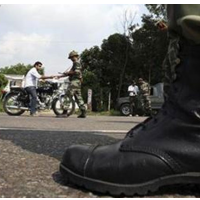AFSPA Repealed in Tripura, Could Other Northeast States Follow?
 AFSPA is in force in much of the northeast (file photo: PTI)
AFSPA is in force in much of the northeast (file photo: PTI)
The northeastern state of Tripura became the first one to repeal the Armed Forces Special Powers Act (AFSPA), a controversial law that had given the military shoot-to-kill powers and shielded soldiers from prosecution for 18 years.
The withdrawal of AFSPA was hailed by human rights groups, who said it could set a benchmark for other states to roll back the special powers used by the army to contain separatist, leftist and tribal rebels.
According to Reuters, the law is still in force in other states of the northeast where violence has surged in recent years. Clashes claimed 450 lives in the region last year, according to the South Asian Terrorism Portal, a think-tank.
But Tripura has been relatively peaceful in recent years, giving the state government a chance to take "a bold step", according to Chief Minister Manik Sarkar.
"The council of ministers decided to withdraw the AFSPA from the state because of significant decrease of militancy," he announced on Thursday.
"We want people to live without fear and the state police will always be there to protect them," he said.
Tripura had imposed AFSPA in 1997 to counter armed factions demanding independence from India. Members of two separatist groups - National Liberation Front of Tripura (NLFT) and All Tripura Tiger Force (ATTF) - are still allegedly sheltered and trained in Bangladesh.
The special powers for "disturbed areas" is currently in force in Manipur (excluding the Imphal Municipal Council area), Assam, Nagaland, and in the Tirap and Changlang districts of Arunachal Pradesh. AFSPA has also been in force in Jammu & Kashmir since 1990.
According to Firstpost, the law provides unlimited powers to security forces to shoot at sight, arrest anybody without a warrant, and carry out searches without consent – with the military personnel knowing they wouldn't face any legal action for such acts.
Abeek Roy, member of the Tripura Human Rights Group, blamed AFSPA for extra-judicial killings and arbitrary detentions by security forces.
"The army tortured people in our state for years and I am glad the government has finally cancelled their license to torture young men and women," he told Reuters.
Congress leader and former home minister P Chidambaram also welcomed the law’s withdrawal.
“My plea to repeal #AFSPA heard in Tripura. AFSPA withdrawn. Victory for sanity and humanity,” Chidambaram tweeted.
Perhaps the most prominent evidence of the decline of militancy in Tripura came last year when the state recorded over 84 percent voter turnout in the Lok Sabha election –one of the highest in the country, according to the Election Commission.
Tripura’s repeal of AFSPA could set a precedent for neighbouring states to wean themselves off this controversial law. The onus may now be on them to justify its continuance.
- Karan Singh
To Learn More:
Tripura strips army of shoot-to-kill powers (by Biswajyoti Das, Reuters)
AFSPA removed in Tripura after 18 years: Why it was enforced and why it's gone now (by Anshu Lal, Firstpost)
Lifting of AFSPA in Tripura hailed as victory for sanity (PTI)
'Good for the NE': Activists hail repeal of Afspa by Tripura govt (by Abhishek Saha, Hindustan Times)
- Top Stories
- Controversies
- Where is the Money Going?
- India and the World
- Appointments and Resignations
- Unusual News
- Latest News
- India College Chain’s Expansion into U.S. Draws Opposition from Massachusetts Officials over Quality of Education
- Milk Shortages in India Tied to Release of New Movies Featuring Nation’s Favorite Stars
- Confusion Swirls around Kashmir Newspaper Ban in Wake of Violent Street Protests
- Polio-Free for 5 Years, India Launches Vaccine Drive after Polio Strain Discovery
- New Aviation Policy Could Increase Service, Lower Ticket Prices






Comments